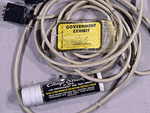At a Glance
Teacher Review
Topics
Website
Features
Duration
Grade(s)
Lesson Format
Download
Watergate and the Constitution
Students analyze a primary source document which sets forth points both for and against the indictment of Richard Nixon, before considering Constitutional interpretations of Watergate.
Review

The strength of this lesson is that it is centered around a document which presents compelling arguments both for and against the indictment of former President Nixon for his role in the Watergate scandal. The featured document, a memo to the Watergate Special Prosecutor Leon Jaworski, was written by Jaworski's staff as he was considering whether or not to indict Nixon.
The memorandum’s language should be accessible to most high school students. Both a copy of the original document and a transcribed version are available.
The question at the center of the lesson is, "Should the Watergate Special Prosecutor seek an indictment of the former President?" If teachers want to make this lesson more of an historical inquiry, we recommend modifying that question to read: "What were the main arguments for and against the indictment of former President Richard Nixon?"
An additional strength of this lesson is two activities that use the Constitution as a lens to understand the Watergate affair. One of the suggested activities asks students to identify the specific role each branch of government played in the Watergate affair. Another activity asks students to apply specific sections of the Constitution and determine the role particular constitutional powers and rights played in the Watergate affair.
This lesson would likely work best after an introductory lesson on Watergate. While there is no formal assessment included in this lesson, the questions presented by the document easily lend themselves to an essay or a discussion.
Notes
| Field | Criteria | Comments | ||
|---|---|---|---|---|
| Historical Content | Is historically accurate? | Yes |
||
| Includes historical background? | Yes |
|||
| Requires students to read and write? | Yes |
|||
| Analytic Thinking | Requires students to analyze or construct interpretations using evidence? | Yes |
||
| Requires close reading and attention to source information? | Yes |
|||
| Scaffolding | Is appropriate for stated audience? | Yes |
||
| Includes materials and strategies for scaffolding and supporting student thinking? | Yes |
|||
| Lesson Structure | Includes assessment criteria and strategies that focus on historical understanding? | No |
||
| Defines clear learning goals and progresses logically? | Yes |
|||
| Includes clear directions and is realistic in normal classroom settings? | Yes |
|||